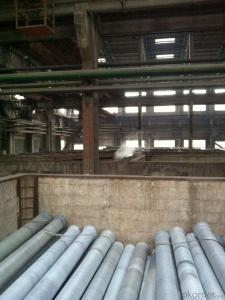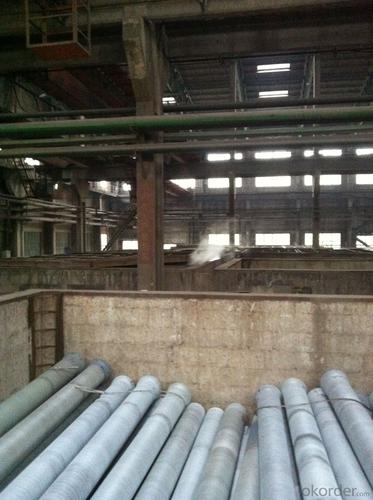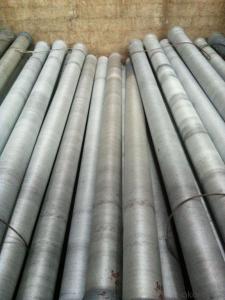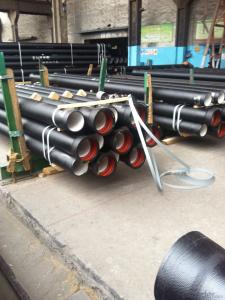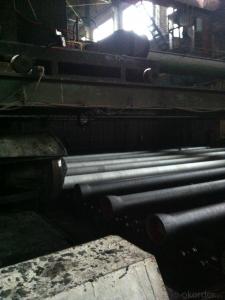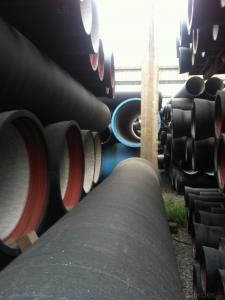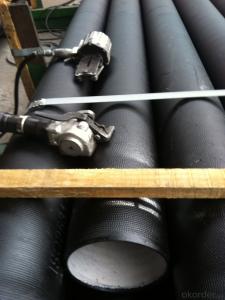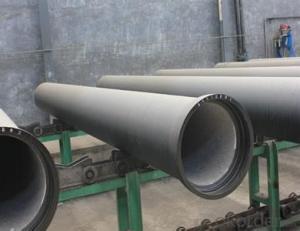DUCTILE IRON PIPE AND PIPE FITTINGS K7 CLASS DN800
- Loading Port:
- Tianjin
- Payment Terms:
- TT OR LC
- Min Order Qty:
- 23 pc
- Supply Capability:
- 3000 pc/month
OKorder Service Pledge
OKorder Financial Service
You Might Also Like
· Material : Ductile Cast Iron
· Size Range : DN 80mm to DN 2000mm
· Unit Effective Length : 6m or 5.7m
· Manufacture Standard: ISO 2531:1998/ EN 545:2006/EN 598:2007
· Annual capacity : 200,000 tons
· Coating Exterior: Zinc 130g/m2 according to ISO 8179-1 and bitumen coating 70 microns.
· Cement Interior: Portland Cement/ High Alumina Cement/ Sulphate Resisting Cement Lining according to ISO 4179
· Special requirements on external coating and internal lining can be applied
· We also provide accessories such as SBR/EPDM rubber gaskets, lubricant paste, pipe caps, PE sleeves, etc.
Additional Parts:
Each pipe is strictly inspected according to related standard to ensure permanently high performance.
Easy Installation at site and service free for life
Long Service Lifespan
Quotation will arrive you within 24hours once we get your inquiry.
We guarantee offering you a competitive price.
A copy of original inspection reports of pipes will be offered after shipment.
Photos of loading process will be sent to the customer after shipment effect.
We will follow-up the delivery progress after shipment effect and update to the customer on weekly basis.
- Q: Can ductile iron be welded? Is weldability comparable to gray iron?
- Nodular cast iron welding can be determined, this should be in some high strength cast iron equipment used more, the tensile strength of normally ductile cast iron welding in welding is higher, is worse than the grey cast iron, it is actually very difficult to distinguish with the naked eye is ductile iron or cast iron the iron in the repair equipment, we usually use WE777 special cast iron electrode universal wide welding, but it is only for maintenance use, the effect is really good, reducing the risk of cracking and high strength welding rod matching to ensure the strength of welding.
- Q: Are ductile iron pipes suitable for installation in areas with high seismic activity?
- Yes, ductile iron pipes are suitable for installation in areas with high seismic activity. Ductile iron pipes have excellent strength and flexibility, allowing them to withstand ground movements caused by earthquakes. Their ability to absorb and distribute stress makes them a reliable choice for underground infrastructure in seismic-prone regions.
- Q: Can ductile iron pipes be used in areas with high soil acidity?
- To ensure the durability and performance of ductile iron pipes in areas with high soil acidity, certain precautions should be taken. Ductile iron pipes are renowned for their strength, durability, and resistance to corrosion, making them suitable for various soil conditions, including those with high acidity. However, the presence of high soil acidity can still pose a potential risk to ductile iron pipes over time. Acidic soils can accelerate the corrosion process, leading to the degradation of the pipe material. To mitigate this risk, the following measures can be implemented: 1. Protective Coatings: Applying protective coatings, such as epoxy or polyethylene, to the outer surface of the pipes adds an extra layer of defense against soil acidity. These coatings act as a barrier, preventing direct contact between the pipe and the corrosive soil. 2. pH Adjustment: Adjusting the pH levels of the soil can help reduce its acidity. This can be achieved by incorporating lime or other neutralizing agents into the soil, creating a more favorable environment for the ductile iron pipes. 3. Cathodic Protection: Employing cathodic protection systems is an effective method to prevent corrosion in ductile iron pipes. This technique involves utilizing sacrificial anodes or impressed current systems to generate a protective electrical current that counteracts the corrosive effects of the soil. 4. Regular Inspections: Conducting periodic inspections is crucial to monitor the condition of the ductile iron pipes in high soil acidity areas. This enables early detection of any corrosion or degradation, facilitating timely repairs or replacements. By implementing these measures, ductile iron pipes can be effectively utilized in areas with high soil acidity, guaranteeing long-term performance and minimizing the risks associated with corrosive soils. However, it is advisable to consult experts or engineers familiar with local soil conditions and project requirements to determine the most suitable materials and protective measures.
- Q: Is the cast iron pipe buried in need of antiseptic treatment? What kind of anticorrosive materials are used?
- Is to put the pipe surface rust corrosion, polished clean, brush again primer, and then wrapped a layer of glass cloth wrapped paint, two layers of glass cloth on the line, the thickness of not less than 6mm, painted with epoxy coal tar paint or asphalt paint
- Q: Can ductile iron pipe be used for industrial wastewater applications?
- Yes, ductile iron pipe can be used for industrial wastewater applications. It has excellent strength, durability, and corrosion resistance, making it suitable for handling various types of wastewater in industrial settings. Additionally, ductile iron pipe is known for its ability to withstand high-pressure and high-temperature conditions, making it a reliable choice for industrial wastewater applications.
- Q: How do ductile iron pipes handle thermal expansion and contraction?
- Ductile iron pipes are specifically designed to handle thermal expansion and contraction effectively. Due to their unique composition and structure, which includes graphite nodules in the iron matrix, these pipes have the ability to accommodate temperature variations without significant damage or distortion. The graphite nodules act as flexible joints, allowing the pipe to expand and contract without cracking or breaking. This characteristic makes ductile iron pipes highly resistant to the stresses caused by thermal fluctuations, ensuring their long-term durability in various temperature environments.
- Q: What is the difference between ductile iron pipes and cast iron pipes?
- Ductile iron pipes and cast iron pipes are both commonly used in various applications, but they differ in their composition, properties, and manufacturing processes. Composition: Ductile iron pipes are made from a type of cast iron known as ductile iron, which contains higher levels of carbon, silicon, and other alloying elements like magnesium. On the other hand, cast iron pipes are made from regular cast iron, which has a higher carbon content and lower levels of alloying elements. Properties: Ductile iron pipes are known for their high tensile strength, flexibility, and durability. They can withstand higher pressure and have a greater resistance to impact, making them suitable for applications that require robust performance. In contrast, cast iron pipes are more brittle and fragile, which makes them prone to cracking or breaking under pressure or impact. Manufacturing process: Ductile iron pipes are created through a process called centrifugal casting, where molten ductile iron is poured into a spinning mold. This centrifugal force helps in distributing the molten metal evenly, resulting in a strong and uniform pipe. Cast iron pipes, on the other hand, are made using a process called sand casting, where molten cast iron is poured into a mold made of compacted sand. This method is less precise and can lead to variations in the final product. Applications: Due to their superior strength and flexibility, ductile iron pipes are commonly used in water and sewage systems, as well as in industrial pipelines that require high-pressure resistance. Cast iron pipes, on the other hand, are typically used in non-pressure applications like drainage systems or underground sewer lines. In summary, the main difference between ductile iron pipes and cast iron pipes lies in their composition, properties, manufacturing processes, and applications. Ductile iron pipes offer greater strength, flexibility, and durability, making them suitable for high-pressure applications, while cast iron pipes are more brittle and commonly used in non-pressure applications.
- Q: Can ductile iron pipes be used in dam or reservoir projects?
- Yes, ductile iron pipes can be used in dam or reservoir projects. Ductile iron pipes are known for their strength, durability, and corrosion resistance, making them suitable for various applications, including water distribution and transmission systems. In dam or reservoir projects, where the pipes need to withstand high pressure and carry large volumes of water, ductile iron pipes are often preferred. They have excellent mechanical properties, including high tensile strength and impact resistance, which ensure their ability to handle the load and provide a reliable and long-lasting solution. Additionally, ductile iron pipes are also adaptable to various installation methods, including trenchless techniques, making them a versatile choice for dam or reservoir projects.
- Q: How do ductile iron pipes perform in high-temperature steam applications?
- Ductile iron pipes are known for their exceptional performance in high-temperature steam applications. They have the ability to withstand elevated temperatures and maintain their structural integrity, making them highly suitable for use in steam distribution systems. One key advantage of ductile iron pipes in high-temperature steam applications is their excellent thermal conductivity. This property allows for efficient heat transfer, ensuring that the steam is delivered at the desired temperature without significant loss. The high thermal conductivity of ductile iron also helps to minimize the risk of thermal expansion and contraction, which can lead to pipe failure or leakage. Furthermore, ductile iron pipes have a high melting point, typically around 2000°F (1093°C), which makes them resistant to the extreme temperatures encountered in steam applications. This ability to withstand high temperatures without deformation or structural failure ensures the reliability and longevity of the piping system. Another important factor contributing to the performance of ductile iron pipes in high-temperature steam applications is their corrosion resistance. These pipes are typically coated with epoxy or other protective materials to prevent corrosion and maintain their structural integrity even in aggressive steam environments. This corrosion resistance helps to ensure that the pipes can withstand the harsh conditions and operate efficiently over an extended period. In summary, ductile iron pipes are well-suited for high-temperature steam applications due to their excellent thermal conductivity, high melting point, and corrosion resistance. These properties make them a reliable and durable choice for steam distribution systems, ensuring the safe and efficient transport of steam at elevated temperatures.
- Q: Can ductile iron pipes be used for underground fire protection systems?
- Yes, ductile iron pipes can be used for underground fire protection systems. Ductile iron pipes have excellent strength and durability, making them suitable for withstanding the high pressure and temperature conditions that may occur during a fire. Additionally, ductile iron pipes have a high resistance to corrosion, which is important for long-term use underground. They also provide excellent flow characteristics, ensuring that water can be quickly and efficiently delivered to extinguish fires. Overall, ductile iron pipes are a reliable and effective choice for underground fire protection systems.
Send your message to us
DUCTILE IRON PIPE AND PIPE FITTINGS K7 CLASS DN800
- Loading Port:
- Tianjin
- Payment Terms:
- TT OR LC
- Min Order Qty:
- 23 pc
- Supply Capability:
- 3000 pc/month
OKorder Service Pledge
OKorder Financial Service
Similar products
Hot products
Hot Searches
Related keywords
